Growing up in Zimbabwe’s capital of Harare, Rosa Mahlasera was not aware of her HIV status. When she was 6, Rosa lost her younger brother to chronic diarrhea and her 2-year-old sister to a prolonged illness. A year later, her father died of tuberculosis, leaving Rosa with only one sibling—her elder brother—and her mother.
The following year, Rosa’s mother decided to tell her children that she is living with HIV.
At that time, Rosa was too young to understand, but when she turned 12 in 2008, she became sick. Her family initially suspected malaria, but clinic tests came back negative—instead, she was screened for and diagnosed with HIV. By this time, Rosa was aware of HIV so she began to cry. Rosa and her mother were told to come back to the clinic the following day for further counselling and a few days later she began taking lifesaving antiretroviral treatment (ART).
Overwhelmed by shame and self-doubt due to stigma associated with HIV, Rosa told her mother not to disclose her HIV status to anyone, including her brother. She was afraid her brother would tell his friends and they would mock and stigmatize her. Rosa was constantly depressed, failing to concentrate at school and becoming unsociable.
Unknown to Rosa, she had been living with HIV since birth.
She took her medication every day without fail, but battled with self-stigma and a fear of death due to AIDS. By this time, she had already began connecting the dots and imagined that her father, sister, and brother might have died because of AIDS-related complications. While at her local clinic, Rosa learned about Community Adolescent Treatment Supporters (CATS) from a nurse who was concerned about her emotional wellbeing. The nurse introduced Rosa to the group and invited her to a support group meeting.
The CATS are HIV-positive young people between eighteen and twenty-four years old who are trained and mentored to provide a package of services for other children and adolescents living with HIV. They are based at facilities and in the communities around the country and help to ensure adolescents and young people with HIV remain engaged in treatment, feel cared for, understood, supported, and valued.
Rosa skeptically sat in the psychosocial group with a dozen healthy adolescents. When they said they were living with HIV, she did not believe them—they looked strong and confident. To reassure Rosa, one of the CATS later showed Rosa her health card and antiretroviral drugs. Inspired by their courage and optimism, she began to frequent these support group meetings.
She received encouragement to overcome her own challenges and increase her knowledge about living positively.
With time she gained self-confidence and began to accept her status. She no longer felt alone and even wanted to become a CATS herself so that she, too, could help and motivate other adolescents who feel lost and lonely as she had.
“Every child needs support,” Rosa says, “If they do not get support, they will think that they are alone, feel stigmatized and give up hope of even taking medication.”
When Rosa turned 18 in 2014, she achieved her aspiration. She was trained as a CATS by Africaid, a community-based organization that partners with the Elizabeth Glaser Pediatric AIDS Foundation (EGPAF) in Zimbabwe to provide HIV care and support to adolescents and young people.
As Rosa became more confident and hopeful, she disclosed her HIV status to her brother. Although her brother cried, Rosa assured him that she is past sympathy and will live a healthy productive life. Her mother was proud of her.
As a CATS, Rosa was based at the clinic where she was tested and receives care. She visited young people living with HIV in their homes, facilitated support groups at the clinic, and helped newly-diagnosed adolescents to come to terms with HIV. Rosa has since graduated from the CATS program but continues to work with youth, promoting HIV testing and providing adherence support.
In 2018, Rosa became an Ambassador for EGPAF. In this role, Rosa has found a platform to further her aspirations to help children and young people live healthy productive lives even in the face of HIV. Driven by her past experience, Rosa is keen to grow her skills in professional counseling so she can continue to support young people living with HIV achieve their own dreams.

Meet the Ambassadors
EGPAF Ambassadors are a community of advocates working together to help EGPAF create a world where no child has AIDS. These passionate voices from around the world include children, young adults, moms, dads, health care workers, and technical experts who have been impacted by HIV.

